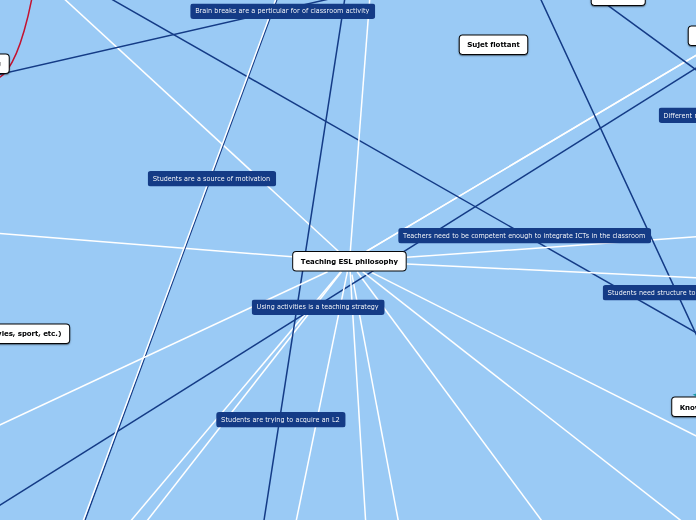Teaching ESL philosophy

Rapport
Collaboration
Working with parents
Connection
Bonding
Understanding
Strength and weaknesses
Student-teacher relationship
Teacher-staff relationship
Communication
Exchange ideas

ICTs
Video recording
Interactive white board
Laptops, desktop, etc.
Typing aids
AudioBooks

Teacher
Helper
Figure of authority
Scholar
Pedagogue
Parental figure
Sujet secondaire
Teaching philosophies
Progressivism
Interest of learners
Creativity
Existentialism
Focus on individual
Needs and interests
Self-knowledge
Role model

Essential knowledge
Self-knowledge
Know your students
Strength
Weakness
Interest
Understanding of the language
Litterature
Grammar
Speach
Teaching strategies
Communicative Abilities
Express yourself clearly
Listening to students' struggles

Course
Buildable
Freedom of subject
Built on interest
Music
Movies
Litterature
History
Drama
Sujet secondaire
Teamwork
Outside of school preparation
Curriculum
Need for rules
Structure

Motivators-ESL
Desire to teach
Passion passed on by a former teacher
Love of English
Creativity in teaching a subject
Vacation
Travel
Skilled in English
Good benefits
Job availability

Classroom activities
Ice breaker
Watch movies
Read books
L2 learning
Brainstorm
Graffiti
Clock buddy
Quiz
Small group discussion in class
Break out rooms for online

Teacher qualities
Open-minded
Sincere
Thoughtful
Intelligent
Considerate
Kind
Elegant
Interesting
Humorous
Mature
Educated
Resourceful
Reliable
Polite
Respectful
Witty
Friendly
Imaginative

Professional competencies
To be competent
Knowledge
Skills
Strategies
Techniques
Attitudes
Perceptions
Adapt to needs
Group needs
Personal needs
Communicate clearly
Plan
Teach
Ethic
Master the language
Openness to multiculturalism
ICTs
Sujet secondaire
Evaluate
Classroom management
Give regular breaks

L2 acquisition
Understand the language
Ability to read
Ability to listen
Comprehension skills
Analyzing skills
Ability to speak the language
Written
Oral
Level of fluency
Grammar and pronounciation

Demotivators
The stress of the job
Work outside of the classroom
Lack of budget
Lack of materials
Bureaucracy
Being undervalued
Problematic class management
Difficult students

Workplace conditions
Respect
Social advantages
Good productivity
Professionalism
Working with collegues
Safe work environment
Regular schedule
Syndicat

Brain Breaks
Music sharing sessions
Trading places
Mingle, mingle, group

Pedagogy
Teaching methods
Hook the students
Group discussions
Text writing
Personalized teaching
What the students learn
Learning process
Receive information
Analyze information
Understand information

Students
In development
To learn
Time organization
Course topic
Social skills
Personality
Need for structure
Need to be captivated
Need for guidance
Different backgrounds
Different needs
